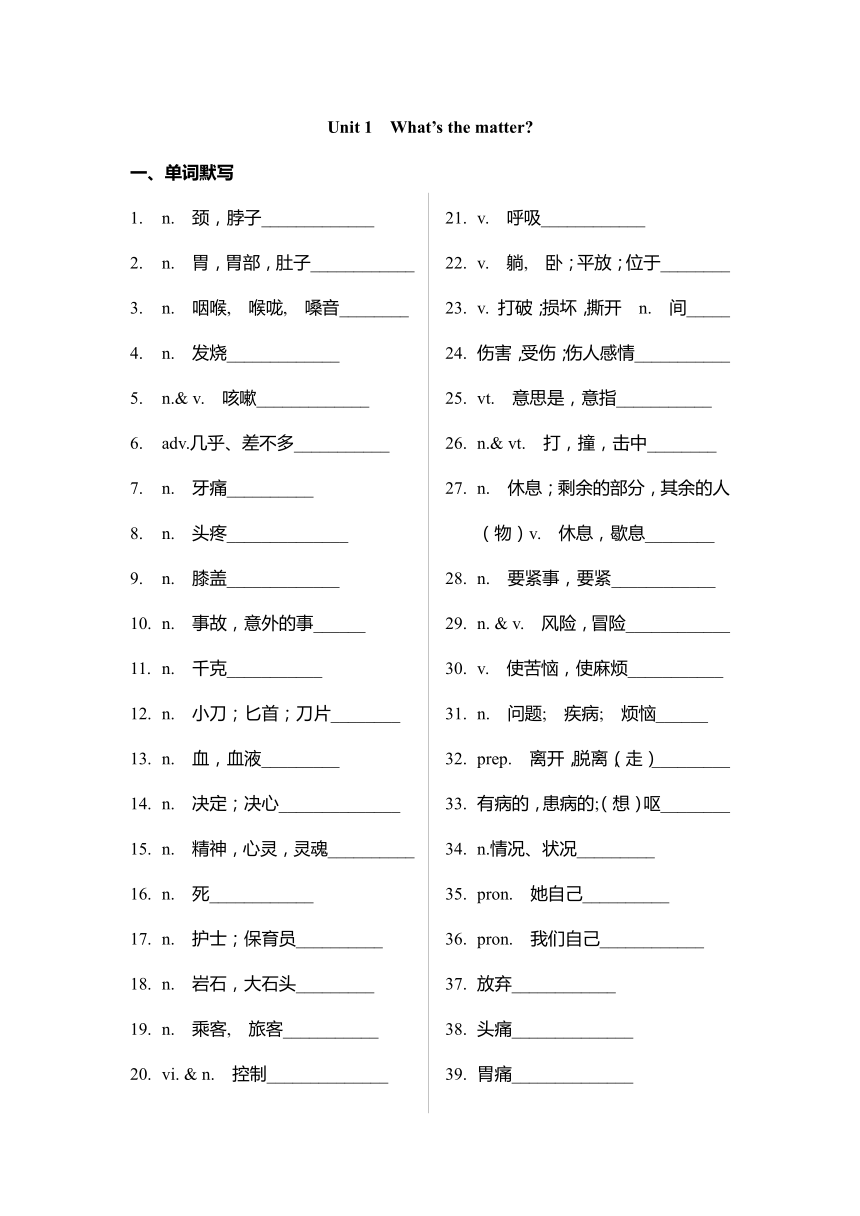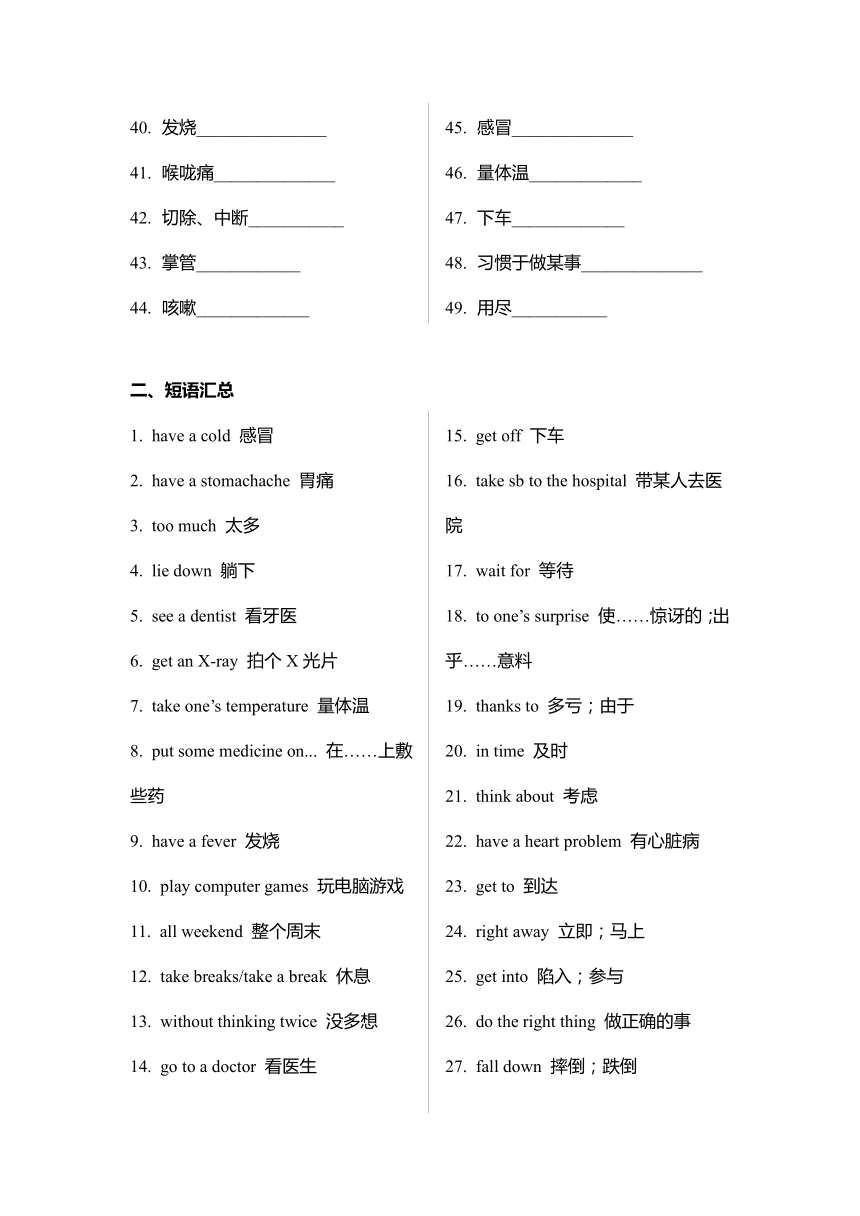Unit 1 What's the matter? 知识点总结2023-2024学年人教版英语八年级下册(无答案)
文档属性
| 名称 | Unit 1 What's the matter? 知识点总结2023-2024学年人教版英语八年级下册(无答案) |

|
|
| 格式 | docx | ||
| 文件大小 | 32.3KB | ||
| 资源类型 | 教案 | ||
| 版本资源 | 人教新目标(Go for it)版 | ||
| 科目 | 英语 | ||
| 更新时间 | 2024-01-26 00:00:00 | ||
图片预览





文档简介
Unit 1 What’s the matter
一、单词默写
n. 颈,脖子_____________
n. 胃,胃部,肚子____________
n. 咽喉, 喉咙, 嗓音________
n. 发烧_____________
n.& v. 咳嗽_____________
adv.几乎、差不多___________
n. 牙痛__________
n. 头疼______________
n. 膝盖_____________
n. 事故,意外的事______
n. 千克___________
n. 小刀;匕首;刀片________
n. 血,血液_________
n. 决定;决心______________
n. 精神,心灵,灵魂__________
n. 死____________
n. 护士;保育员__________
n. 岩石,大石头_________
n. 乘客, 旅客___________
vi. & n. 控制______________
v. 呼吸____________
v. 躺, 卧;平放;位于________
v. 打破;损坏,撕开 n. 间_____
伤害,受伤;伤人感情___________
vt. 意思是,意指___________
n.& vt. 打,撞,击中________
n. 休息;剩余的部分,其余的人(物)v. 休息,歇息________
n. 要紧事,要紧____________
n. & v. 风险,冒险____________
v. 使苦恼,使麻烦___________
n. 问题; 疾病; 烦恼______
prep. 离开,脱离,(走)_________
有病的,患病的;(想)呕________
n.情况、状况_________
pron. 她自己__________
pron. 我们自己____________
放弃____________
头痛______________
胃痛______________
发烧_______________
喉咙痛______________
切除、中断___________
掌管____________
咳嗽_____________
感冒______________
量体温_____________
下车_____________
习惯于做某事______________
用尽___________
二、短语汇总
have a cold 感冒
have a stomachache 胃痛
too much 太多
lie down 躺下
see a dentist 看牙医
get an X-ray 拍个X光片
take one’s temperature 量体温
put some medicine on... 在……上敷些药
have a fever 发烧
play computer games 玩电脑游戏
all weekend 整个周末
take breaks/take a break 休息
without thinking twice 没多想
go to a doctor 看医生
get off 下车
take sb to the hospital 带某人去医院
wait for 等待
to one’s surprise 使……惊讶的;出乎……意料
thanks to 多亏;由于
in time 及时
think about 考虑
have a heart problem 有心脏病
get to 到达
right away 立即;马上
get into 陷入;参与
do the right thing 做正确的事
fall down 摔倒;跌倒
play soccer 踢足球
put...on sth 把……放在某物上
a few 一些;几个
come in 进来
get hit/sunburned 被打击/晒伤
be interested in 对……感兴趣
take risks/take a risk 冒险
lose one’s life 失去生命
because of 因为
by oneself 独自;单独
run out (of) 用尽;耗尽
cut off 切除
get out of 离开;从……出来
make a decision /make decisions 做决定
be in control of 掌管;管理
go mountain climbing 去爬山
give up 放弃
知识点汇总
知识点1 询问疾病的句型
知识点2 表达疾病的句型
知识点3 lie
知识点4 enough
知识点5 see sb do/doing sth
知识点6 get短语
知识点7 without/with表伴随
知识点8 to one's surprise
知识点9 agree
知识点10 thanks to
知识点11 too much/too many/much too辨析
解析版
知识点1 询问疾病的句型
What’s the matter with …
=What’s wrong with …
= What’s up with…
=What’s the trouble with…
= Is there anything wrong with you
=What happened
知识点2 表达疾病的句型
have a + 疾病
have a + 身体部位-ache
have a sore + 身体部位
知识点3 lie
lie down躺下
做动词,意为“躺;位于”,过去式和过去分词为lay,lain.
做为动词或名词,意为“撒谎;谎言”,过去式和过去分词为lied,lied.
知识点4 enough
adj.足够的,充分的 修饰名词时,可放在名词之前
adv.足够地, 十分,相当。修饰adj./adv,放在adj./adv 后
be +adj. +enough to do sth
知识点5 see sb do/doing sth
see sb. doing sth. “看见某人正在做某事”,强调看到的动作正在进行;
see sb. do sth. “看见某人做了某事”,强调看见动作的全过程或看见动作经常发生。
知识点6 get短语
get off 下车
get on 上车
get up起床
get into陷入
get out of摆脱
get on/along well with与……相处融洽
get to到达
知识点7 without/with表伴随
without后接名词、代词宾格或v-ing作宾语,其反义词为with。
without doing sth
without thinking twice毫不犹豫
知识点8 to one's surprise
to one’s surprise意为"使……惊讶的;出乎……意料",一般位于句首。其中one’s是形容词性物主代词或名词所有格。
surprising“令人惊讶的”,常用来形容事/物。
surprised “感到惊讶的”,常用来形容人。
知识点9 agree
agree v→ (反)disagree – agreement n同意
agree with sb. 同意某人 I
agree to do sth 同意做某事
知识点10 thanks to
thanks to 意为“由于、多亏”
thanks for ,意为“因……而感谢”
知识点11 too much/too many/much too辨析
1.too much “太多”(+不可数名词)
2.too many “太多”( +可数名词)
3.much too+adj/adv 实在太....
课堂练习
一、单项选择
1.Linda has trouble ____________ Chinese history.
A.learning B.learn C.to learn D.learned
2.Ben is used to __________ to school. He used to __________ the bus to school last year.
A.walking; taking B.walk; take C.walking; take D.walk; taking
3.Where will you ____________
A.get out B.get off C .get out of D.get of
4.His money______________ . He asked his mother for some.
A.ran out of B.is run out C.was run out D.ran out
5.If you keep on ______________, you’ll succeed.
A.try B.to try C.trying D.tries
6.My dog ________ yesterday. Its ________ made me sad.
A.die; dead B.died; dying C.died; death D.dead; died
7.The girl’s father is ________. She has to look after her ________ father at home.
A.bad; sick B.ill; bad C.ill; sick D.sick; ill
8.—Mr. Wang, I found my purse(钱包)________ open on Vivian’s table yesterday afternoon.
—Really I couldn’t believe that she ________ to me yesterday.
A.lie; lied B.lied; lied C.lay; lied
9.The article is too long, so you have to _________ it _________.
A.cut; down B.cut; off C.cut; up D.cut; away
10.In order to speak English better, we ________ be afraid of losing face, because the most important thing is to practice.
A.should B.shouldn’t C.have to D.must
二、用所给单词的适当形式填空
1. I _________(study) at that middle school half a year ago.
2 Paul is good at climbing. He is a great _________(climb).
3. Cathy, you should ________ (look) after him when you stay with your brother.
4. The old man lost a lot of ________ (blood)in the accident. I'm afraid he might die.
5. I think it’s important ___________ (sleep) eight hours a night.
6..Most of us don't agree ________ (go) there by bike.
7.He always thinks little about __________ (him) but much about others.
8.At that time, Dr.Bethune just thought about _________ (save) more soldiers' lives.
9.Jack found a wallet under a tree when ________(climb) Mount Hua last year.
10.I saw Jack____________(clean) the classroom when I came in.
三、根据汉语提示完成句子
1.我的爷爷习惯早起
2.老师必须管理好他(她)的课堂
3.我弟弟学习英语很吃力
4.这个周末我们准备去远足
5.今天我感觉很不舒服
你应该在上面敷一些药。
__________________________________________。
你需要远离电脑休息。
__________________________________________。
8.我以同样的方式做了太久,没有移动。__________________________________________。
司机看见一位老人正躺在路边。__________________________________________。
司机停下车没有过多思考。
__________________________________________。
四、句型转换
1.My father has a headache. (改为一般疑问句)
your father a headache
2.一Should I cut up the carrots (补全否定答语)
—No, .
3.What's wrong with you (改为同义句)
What's with you
4.He should put some medicine on it. (改为否定句)
He put medicine on it.
5.Mrs. Hand's daughter has a stomachache. (对划线部分提问)
Mrs. Hand's daughter
一、单词默写
n. 颈,脖子_____________
n. 胃,胃部,肚子____________
n. 咽喉, 喉咙, 嗓音________
n. 发烧_____________
n.& v. 咳嗽_____________
adv.几乎、差不多___________
n. 牙痛__________
n. 头疼______________
n. 膝盖_____________
n. 事故,意外的事______
n. 千克___________
n. 小刀;匕首;刀片________
n. 血,血液_________
n. 决定;决心______________
n. 精神,心灵,灵魂__________
n. 死____________
n. 护士;保育员__________
n. 岩石,大石头_________
n. 乘客, 旅客___________
vi. & n. 控制______________
v. 呼吸____________
v. 躺, 卧;平放;位于________
v. 打破;损坏,撕开 n. 间_____
伤害,受伤;伤人感情___________
vt. 意思是,意指___________
n.& vt. 打,撞,击中________
n. 休息;剩余的部分,其余的人(物)v. 休息,歇息________
n. 要紧事,要紧____________
n. & v. 风险,冒险____________
v. 使苦恼,使麻烦___________
n. 问题; 疾病; 烦恼______
prep. 离开,脱离,(走)_________
有病的,患病的;(想)呕________
n.情况、状况_________
pron. 她自己__________
pron. 我们自己____________
放弃____________
头痛______________
胃痛______________
发烧_______________
喉咙痛______________
切除、中断___________
掌管____________
咳嗽_____________
感冒______________
量体温_____________
下车_____________
习惯于做某事______________
用尽___________
二、短语汇总
have a cold 感冒
have a stomachache 胃痛
too much 太多
lie down 躺下
see a dentist 看牙医
get an X-ray 拍个X光片
take one’s temperature 量体温
put some medicine on... 在……上敷些药
have a fever 发烧
play computer games 玩电脑游戏
all weekend 整个周末
take breaks/take a break 休息
without thinking twice 没多想
go to a doctor 看医生
get off 下车
take sb to the hospital 带某人去医院
wait for 等待
to one’s surprise 使……惊讶的;出乎……意料
thanks to 多亏;由于
in time 及时
think about 考虑
have a heart problem 有心脏病
get to 到达
right away 立即;马上
get into 陷入;参与
do the right thing 做正确的事
fall down 摔倒;跌倒
play soccer 踢足球
put...on sth 把……放在某物上
a few 一些;几个
come in 进来
get hit/sunburned 被打击/晒伤
be interested in 对……感兴趣
take risks/take a risk 冒险
lose one’s life 失去生命
because of 因为
by oneself 独自;单独
run out (of) 用尽;耗尽
cut off 切除
get out of 离开;从……出来
make a decision /make decisions 做决定
be in control of 掌管;管理
go mountain climbing 去爬山
give up 放弃
知识点汇总
知识点1 询问疾病的句型
知识点2 表达疾病的句型
知识点3 lie
知识点4 enough
知识点5 see sb do/doing sth
知识点6 get短语
知识点7 without/with表伴随
知识点8 to one's surprise
知识点9 agree
知识点10 thanks to
知识点11 too much/too many/much too辨析
解析版
知识点1 询问疾病的句型
What’s the matter with …
=What’s wrong with …
= What’s up with…
=What’s the trouble with…
= Is there anything wrong with you
=What happened
知识点2 表达疾病的句型
have a + 疾病
have a + 身体部位-ache
have a sore + 身体部位
知识点3 lie
lie down躺下
做动词,意为“躺;位于”,过去式和过去分词为lay,lain.
做为动词或名词,意为“撒谎;谎言”,过去式和过去分词为lied,lied.
知识点4 enough
adj.足够的,充分的 修饰名词时,可放在名词之前
adv.足够地, 十分,相当。修饰adj./adv,放在adj./adv 后
be +adj. +enough to do sth
知识点5 see sb do/doing sth
see sb. doing sth. “看见某人正在做某事”,强调看到的动作正在进行;
see sb. do sth. “看见某人做了某事”,强调看见动作的全过程或看见动作经常发生。
知识点6 get短语
get off 下车
get on 上车
get up起床
get into陷入
get out of摆脱
get on/along well with与……相处融洽
get to到达
知识点7 without/with表伴随
without后接名词、代词宾格或v-ing作宾语,其反义词为with。
without doing sth
without thinking twice毫不犹豫
知识点8 to one's surprise
to one’s surprise意为"使……惊讶的;出乎……意料",一般位于句首。其中one’s是形容词性物主代词或名词所有格。
surprising“令人惊讶的”,常用来形容事/物。
surprised “感到惊讶的”,常用来形容人。
知识点9 agree
agree v→ (反)disagree – agreement n同意
agree with sb. 同意某人 I
agree to do sth 同意做某事
知识点10 thanks to
thanks to 意为“由于、多亏”
thanks for ,意为“因……而感谢”
知识点11 too much/too many/much too辨析
1.too much “太多”(+不可数名词)
2.too many “太多”( +可数名词)
3.much too+adj/adv 实在太....
课堂练习
一、单项选择
1.Linda has trouble ____________ Chinese history.
A.learning B.learn C.to learn D.learned
2.Ben is used to __________ to school. He used to __________ the bus to school last year.
A.walking; taking B.walk; take C.walking; take D.walk; taking
3.Where will you ____________
A.get out B.get off C .get out of D.get of
4.His money______________ . He asked his mother for some.
A.ran out of B.is run out C.was run out D.ran out
5.If you keep on ______________, you’ll succeed.
A.try B.to try C.trying D.tries
6.My dog ________ yesterday. Its ________ made me sad.
A.die; dead B.died; dying C.died; death D.dead; died
7.The girl’s father is ________. She has to look after her ________ father at home.
A.bad; sick B.ill; bad C.ill; sick D.sick; ill
8.—Mr. Wang, I found my purse(钱包)________ open on Vivian’s table yesterday afternoon.
—Really I couldn’t believe that she ________ to me yesterday.
A.lie; lied B.lied; lied C.lay; lied
9.The article is too long, so you have to _________ it _________.
A.cut; down B.cut; off C.cut; up D.cut; away
10.In order to speak English better, we ________ be afraid of losing face, because the most important thing is to practice.
A.should B.shouldn’t C.have to D.must
二、用所给单词的适当形式填空
1. I _________(study) at that middle school half a year ago.
2 Paul is good at climbing. He is a great _________(climb).
3. Cathy, you should ________ (look) after him when you stay with your brother.
4. The old man lost a lot of ________ (blood)in the accident. I'm afraid he might die.
5. I think it’s important ___________ (sleep) eight hours a night.
6..Most of us don't agree ________ (go) there by bike.
7.He always thinks little about __________ (him) but much about others.
8.At that time, Dr.Bethune just thought about _________ (save) more soldiers' lives.
9.Jack found a wallet under a tree when ________(climb) Mount Hua last year.
10.I saw Jack____________(clean) the classroom when I came in.
三、根据汉语提示完成句子
1.我的爷爷习惯早起
2.老师必须管理好他(她)的课堂
3.我弟弟学习英语很吃力
4.这个周末我们准备去远足
5.今天我感觉很不舒服
你应该在上面敷一些药。
__________________________________________。
你需要远离电脑休息。
__________________________________________。
8.我以同样的方式做了太久,没有移动。__________________________________________。
司机看见一位老人正躺在路边。__________________________________________。
司机停下车没有过多思考。
__________________________________________。
四、句型转换
1.My father has a headache. (改为一般疑问句)
your father a headache
2.一Should I cut up the carrots (补全否定答语)
—No, .
3.What's wrong with you (改为同义句)
What's with you
4.He should put some medicine on it. (改为否定句)
He put medicine on it.
5.Mrs. Hand's daughter has a stomachache. (对划线部分提问)
Mrs. Hand's daughter
同课章节目录
- Unit 1 What's the matter?
- Section A
- Section B
- Unit 2 I'll help to clean up the city parks.
- Section A
- Section B
- Unit 3 Could you please clean your room?
- Section A
- Section B
- Unit 4 Why don't you talk to your parents?
- Section A
- Section B
- Unit 5 What were you doing when the rainstorm came
- Section A
- Section B
- Review of Units 1-5
- Unit 6 An old man tried to move the mountains.
- Section A
- Section B
- Unit 7 What's the highest mountain in the world?
- Section A
- Section B
- Unit 8 Have you read Treasure Island yet?
- Section A
- Section B
- Unit 9 Have you ever been to a museum?
- Section A
- Section B
- Unit 10 I've had this bike for three years.
- Section A
- Section B
